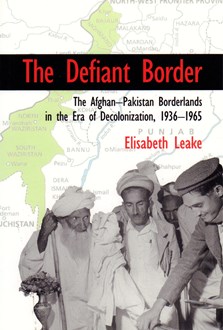The defiant border : the Afghan-Pakistan borderlands in the era of decolonization, 1936-1965 / Elisabeth Leake.
Yer Numarası
A.IX/3488
ISBN
9781107126022 (hardback)
9781107571563 (paperback)
9781107571563 (paperback)
Dil Kodu
İngilizce
Yazar
Basım Bildirimi
First published.
Yayın Bilgisi
Cambridge ; New York : Cambridge University Press, 2017.
Fiziksel Niteleme
xiii, [4] sayfa harita, 259 sayfa : harita ; 23 cm.
Dizi
Cambridge studies in US foreign relations
Genel Not
İndeks s. 255-259.
Bibliyografi, vb. Notu
Bibliyografik bilgi içerir.
İçindekiler Notu
Introduction: “A doughty & honorable opponent“ -- “Using a Crowbar to Swat Wasps“ : The Frontier Tribal Area in Imperial Defense -- The “Opening of Sluice Gates“ : Plan Partition and the Frontier -- “We are One People and Ours is a Land“ : The Demand for Pashtunistan, 1948-1952 -- A “Friendly Point of Return“ : Pakistan and the Global Cold War -- An “Eye for an Eye“ : Mohammad Ayub Khan and the Collapse of Regional Relations -- Conclusion: “Religion, Land, Lineage, and Honour“ : The Afghan-Pakistan Borderlands Then and Now.
Özet, vb.
“The Defiant Border explores why the Afghan-Pakistan borderlands have remained largely independent of state controls from the colonial period into the twenty-first century. This book looks at local Pashtun tribes' modes for evading first British colonial, then Pakistani, governance; the ongoing border dispute between Pakistan and Afghanistan; and continuing interest in the region from Indian, US, British, and Soviet actors. It reveals active attempts first by British, then by Pakistani, agents to integrate the tribal region, ranging from development initiatives to violent suppression. The Defiant Border also considers the area's influence on relations between Pakistan, Afghanistan, and India, as well as its role in the United States' increasingly global Cold War policies. Ultimately, the book considers how a region so peripheral to major centers of power has had such an impact on political choices throughout the eras of empire, decolonization, and superpower competition, up to the so-called 'War on Terror.' One of the only historical studies of Pakistan's Pashtun tribal area (post-1947), which complements existing anthropological literature on the region and histories of the colonial era to provide readers with a fuller understanding of the region. Integrates histories of South Asia, decolonization, and the global Cold War, which provides readers with a holistic view of the region by recognizing the interconnections between international diplomacy, regional developments, subaltern movements, and colonial legacies. Considers the impact of non-state actors--Pashtun tribes--on South Asian state-building, which complements work done on state-building in India, extends understanding of the impact of peripheral areas on state power and practice, and expands understanding of the history of Pakistan.“ -- Yayıncı.
Konu
Sınır bölgeleri__Afganistan__Tarih__20. yy.
Sınır bölgeleri__Pakistan__Tarih__20. yy.
Dekolonizasyon__Güney Asya__Tarih__20. yy.
Peştunlar__Tarih__20. yy.
Dünya siyaseti__1933-1945.
Dünya siyaseti__1945-1989.
Afganistan__İlişkiler__Pakistan.
Pakistan__İlişkiler__Afganistan.
Afganistan__Yönetim ve politikalar__20. yy.
Pakistan__Yönetim ve politikalar__20. yy.
Sınır bölgeleri__Pakistan__Tarih__20. yy.
Dekolonizasyon__Güney Asya__Tarih__20. yy.
Peştunlar__Tarih__20. yy.
Dünya siyaseti__1933-1945.
Dünya siyaseti__1945-1989.
Afganistan__İlişkiler__Pakistan.
Pakistan__İlişkiler__Afganistan.
Afganistan__Yönetim ve politikalar__20. yy.
Pakistan__Yönetim ve politikalar__20. yy.

 English
English

